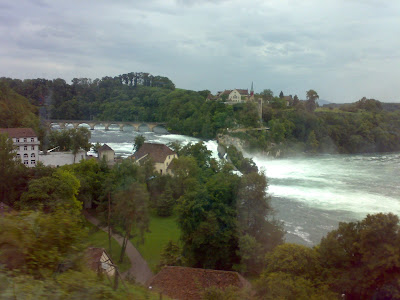I think one of the first things that comes to mind when one thinks of Germany, other than beer, are the castles. One castle is called a "Schloss" in German. A Schloss is a very elaborate castle that someone used to live in. There is another German word "Burg" and that is more of a fortress, that no one really lived in, but from the outside, they look sort of similar.
This last weekend was a whirlwind of travelling. I went to see Johannes and Julia in Weinheim, and it was nice to catch up with them. I got back to Rad around 10pm and crashed into bed because I had to wake up at 5am to get on a train to see Neuschwanstein!
Actually 10 of us went together. We got a schönes Wochenende ticket, which lets 5 people travel on any of the slower trains in Germany all day. It only costs 39€ total. Since we couldn't use the fast trains, we had to set out early to get to Munich by noon. The trip there was gorgeous. Bavaria is a gorgeous part of Germany. It looks a lot like Kentucky, but the other Germans think of Bavaria like we think of Texas. Basically, the Bavarians are a whole different race of people.
We had to change trains in Lindau, and after spending a few minutes there we all resolved to go back there.

I should mention that this trip took place on a Sunday, which means that Germany was SHUT DOWN. I'm surprised that trains run, actually. If you want food on a Sunday, you are s.o.l. Because of this, Lindau was deserted, and that made it seem like a fairy tail.
After our layover we went further toward Neuschwanstein, and saw more of the beautiful Bavarian countryside.

Upon reaching our destination, we ran into a small snag. Our reservation to tour the castle wasn't showing up on the (purple-haired, 60 year-old) ticket agent's screen. Luckily Joe, was able to sweet talk her into giving us a reservation. It turned out that ours was actually scheduled for October.
While we waited for our reservation we checked out the scenic views in the area.

I have to say that I wasn't that impress with the outside of the castle. I mean, yeah, it's on a mountain, and yeah, it's got a gorgeous view, and yeah, it's old, but I was expecting something more...Disney.
The inside of the castle didn't disappoint. Ludwig II died before it was finished and the people were clearly not eager to continue their labors, so it is largely unfinished. We weren't allowed to photograph the inside of the castle; heaven forbid I decide to decorate my living room with a scene of the 12 apostles and a mosaic of all life on Earth and copy their style...
It was gorgeous, but alas, all good things must end. We decided to get some lunch, weißwurst and dunkel bier, and headed home.
But wait, our fantastic trip did have a snag. Our trains home were late and at a crucial connection our train came in late, but the other trains were waiting for us. Now keep in mind, we have group tickets and it's close to the last train. We get out of the train and the conductor motions (shouts) that we should go to platform three. We looked at platform 8, and it had the train we were supposed to go to. At this point, indecision splits our group and 7 of us go to platform 8 and 3 of us go to platform 3. My group was correct (platform 8), but the other three we stranded in Friedrichshafen without a ticket. It all ended up working out for the best. Two of us stayed behind at the next stop and waited for the other three and we all go home before 1am.














